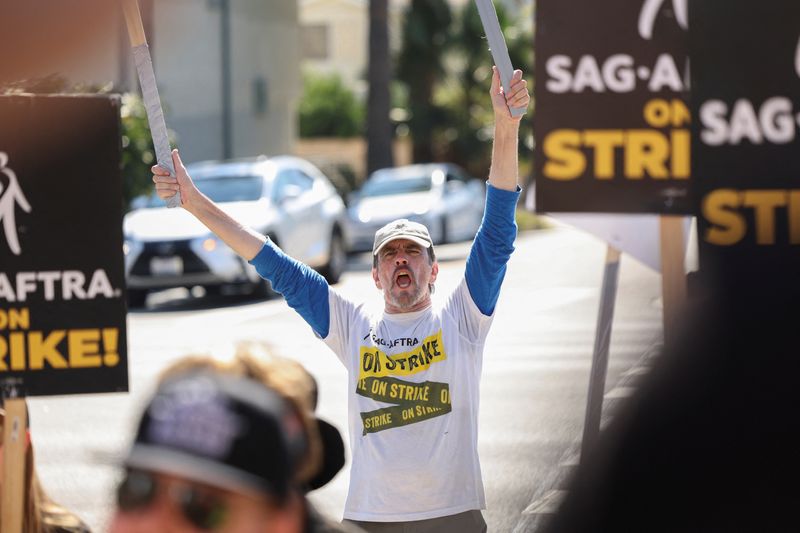By Lisa Richwine, Dawn Chmielewski and Danielle Broadway
LOS ANGELES (Reuters) -Hollywood actors reached a tentative agreement with major studios on Wednesday to resolve the second of two strikes that rocked the entertainment industry as writers and performers demanded higher pay in the streaming TV era.
The 118-day work stoppage ended just after midnight, the SAG-AFTRA union said in a statement after its negotiating committee unanimously backed the deal with Walt Disney (NYSE:DIS), Netflix (NASDAQ:NFLX) and other companies.
Valued at more than $1 billion, the three-year contract includes increases in minimum salaries and a new bonus paid by streaming services, the union said.
The deal also provides protections against unauthorized use of images generated by artificial intelligence (AI), an area that had emerged as a major concern from performers who feared being replaced by "digital doubles."
"We have arrived at a contract that will enable SAG-AFTRA members from every category to build sustainable careers," the union said in a note to members.
SAG-AFTRA President and "The Nanny" star Fran Drescher wrote on Instagram: "We did it!!!! The Billion+ $ Deal!"
Celebrations erupted across Los Angeles. The resolution of the actors' strike means Hollywood can ramp up to full production for the first time since May, when film and TV writers walked off the job.
At one brewpub, a jubilant crowd of actors cheered, pumped their fists and chanted "When we fight, we win!"
"It's just such a feeling of joy, and of triumph over adversity, and not quitting," said actor Evan Shafran.
Another SAG-AFTRA member, Jessica Brown, was still absorbing the news. "My brain is still just trying to catch up and process," she said. "Oh my god. We did it."
SAG-AFTRA's national board will consider the agreement on Friday, and the union said it would release further details after that meeting. A final ratification vote by members is expected to take place in the coming weeks.
Shares of television and film production companies rallied in premarket action Thursday. Walt Disney shares were up 4.5%, Warner Bros Discovery (NASDAQ:WBD) gained 2.5%, and Paramount Global gained 2.7%.
NEW PARADIGM
The Alliance of Motion Picture and Television Producers (AMPTP), which negotiated on behalf of the studios, said the agreement represented "a new paradigm" that gave the union its "biggest contract-on-contract gains" in its history.
The organization said it "looks forward to the industry resuming the work of telling great stories."
"I'm relieved," actor Fanny Grande said. "It's been really difficult for most people in the industry, especially people of color. As it is, we don't have as many opportunities. We aren't big celebrities that have money in the bank for months."
Word of a potential agreement had spread across Hollywood earlier on Wednesday, raising hopes among actors who had spent months picketing outside studio offices in New York and Los Angeles instead of working on sets.
"Preliminary chatter was that a vote was imminent," said Rati Gupta, best known as Anu in the CBS comedy "The Big Bang Theory." "Hearts have been pounding for several hours today."
When SAG-AFTRA's bargaining team voted to support the deal, "there were definitely some tears, a lot of big smiles, a lot of hugs," chief negotiator Duncan Crabtree-Ireland said. "It is a really intense thing to be going through a strike that's this long and so challenging."
Actors had similar concerns to film and television writers, who argued that compensation for working-class cast members had dwindled as streaming took hold, making it hard to earn a living wage. TV series on streaming have not offered the same residual payments that actors enjoyed during the heyday of broadcast TV.
Performers also became alarmed by recent advances in artificial intelligence, which they feared could lead to studios manipulating their likenesses without permission or replacing human actors with digital images.
George Clooney and other A-list stars voiced solidarity with lower-level actors and had urged union leadership to reach a resolution.
Many film and TV sets shut down when the Writers Guild of America (WGA) called a strike in the spring. While WGA members returned to penning scripts in late September, the ongoing SAG-AFTRA work stoppage left many productions dark.
The disruptions cost California more than $6 billion in lost output, according to a Milken Institute estimate.
With little work available, many prop masters, costume designers and other crew members struggled to make ends meet. FilmLA, the group that approves filming permits, reported scripted production during the week of Oct. 29 had fallen 77% from the same time a year earlier.
The Hollywood strikes came during a year of other high-profile job actions. The United Auto Workers recently ended six weeks of walkouts at Detroit carmakers. Teachers, nurses and healthcare workers also walked off the job.

Hollywood's work stoppages forced broadcast networks to fill their fall lineups with re-runs, games shows and reality shows. It also led movie studios to delay big releases such as "Dune: Part 2" because striking actors could not promote them.
Other major films, including the latest installment of the "Mission: Impossible" franchise and Disney's live-action remake of animated classic "Snow White," were postponed until 2025.